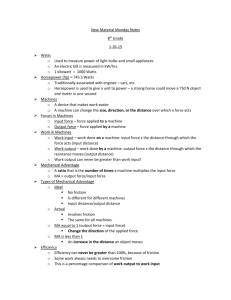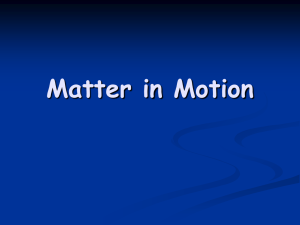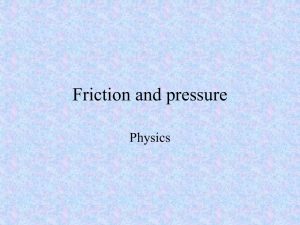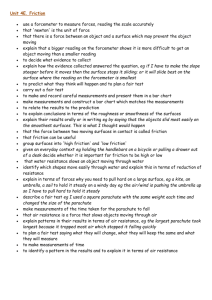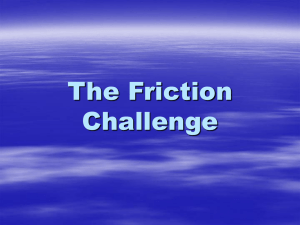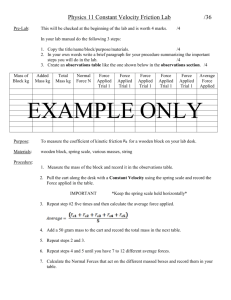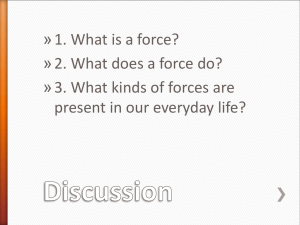Physical Science Notes 3-7-08
advertisement
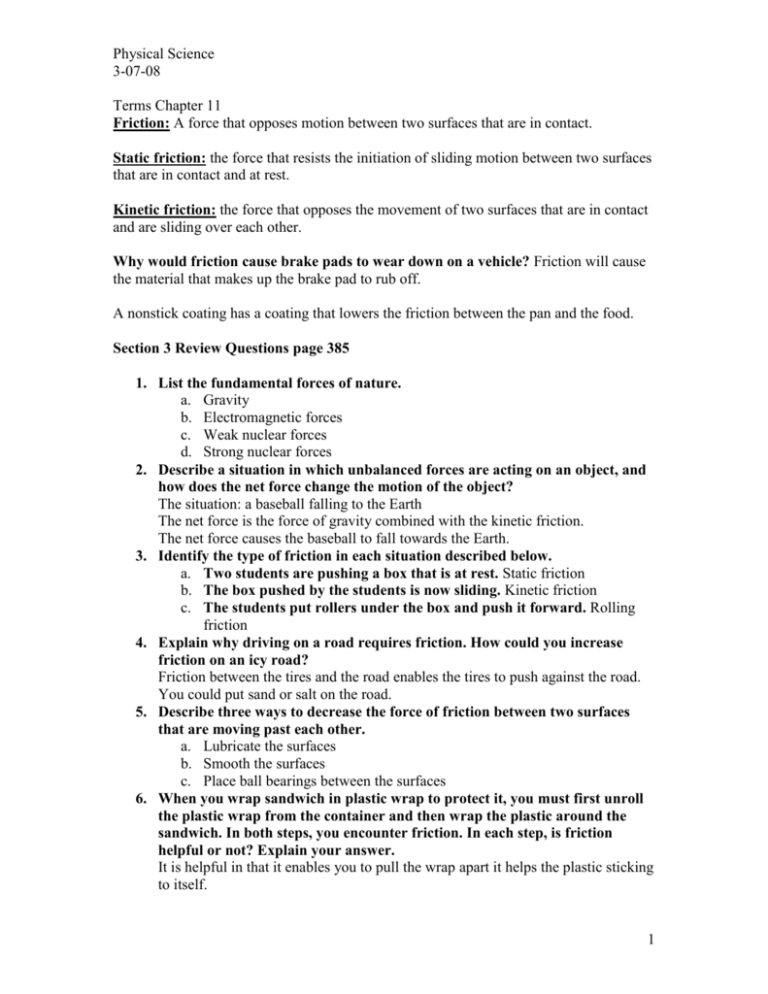
Physical Science 3-07-08 Terms Chapter 11 Friction: A force that opposes motion between two surfaces that are in contact. Static friction: the force that resists the initiation of sliding motion between two surfaces that are in contact and at rest. Kinetic friction: the force that opposes the movement of two surfaces that are in contact and are sliding over each other. Why would friction cause brake pads to wear down on a vehicle? Friction will cause the material that makes up the brake pad to rub off. A nonstick coating has a coating that lowers the friction between the pan and the food. Section 3 Review Questions page 385 1. List the fundamental forces of nature. a. Gravity b. Electromagnetic forces c. Weak nuclear forces d. Strong nuclear forces 2. Describe a situation in which unbalanced forces are acting on an object, and how does the net force change the motion of the object? The situation: a baseball falling to the Earth The net force is the force of gravity combined with the kinetic friction. The net force causes the baseball to fall towards the Earth. 3. Identify the type of friction in each situation described below. a. Two students are pushing a box that is at rest. Static friction b. The box pushed by the students is now sliding. Kinetic friction c. The students put rollers under the box and push it forward. Rolling friction 4. Explain why driving on a road requires friction. How could you increase friction on an icy road? Friction between the tires and the road enables the tires to push against the road. You could put sand or salt on the road. 5. Describe three ways to decrease the force of friction between two surfaces that are moving past each other. a. Lubricate the surfaces b. Smooth the surfaces c. Place ball bearings between the surfaces 6. When you wrap sandwich in plastic wrap to protect it, you must first unroll the plastic wrap from the container and then wrap the plastic around the sandwich. In both steps, you encounter friction. In each step, is friction helpful or not? Explain your answer. It is helpful in that it enables you to pull the wrap apart it helps the plastic sticking to itself. 1 Physical Science 3-07-08 It is harmful in that it slows the flow of the wrap 7. The force pulling a truck downhill is 2,000 N. What is the amount of static friction acting on the truck if the truck does not move? If there is no acceleration the net force is “0”. The force of static friction is equal but in the opposite direction of the force pulling the truck down the hill. Page 388 Practice problems 1. Does the graph indicate an increase or decrease in distance during different time intervals? Explain. Increase prior to 22.5 seconds, after 22.5 seconds the distance remains constant 2. Identify the independent and dependent variables. What is the relationship between the two variables. The independent variable will be time, dependent variable will be distance As the time increase, the distance increases. (It’s proportional) 3. What is the runner’s maximum speed? During what time interval does the runner reach this speed? What is the runner’s maximum speed? 8.0 m/s Between 15-17.5 seconds Minimum speed: 0 m/s 4. What is the total distance traveled by the runner? What trend suggests that this is the total distance run even though the graph continues? total distance traveled: 45 m The runner has stopped moving after 22.5 seconds, indicated by the horizontal line. Infer: the run is over at 22.5 seconds. 5. How is this graph similar to any graph showing distance traveled in a single direction over a given time interval? All graphs have a positive slope, indicating an increase in distance with time regardless of change in speed. 6. For each object (A, B, C), does the graph indicate an increase, decrease, or no change in speed? Increase in speed for objects A and B. Constant speed for object C 7. Which object has the greatest acceleration? Which object is not accelerating? greatest acceleration: object B not accelerating: object C 8. Could you graph the same data on a distance vs. time graph? yes 2

